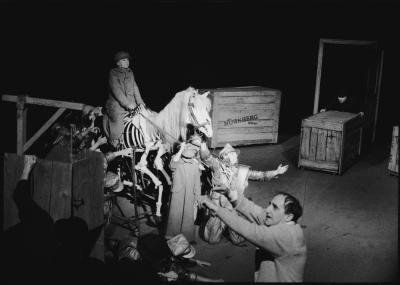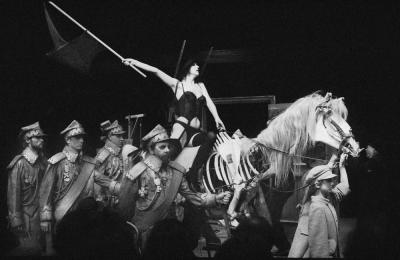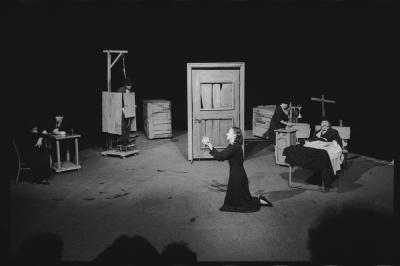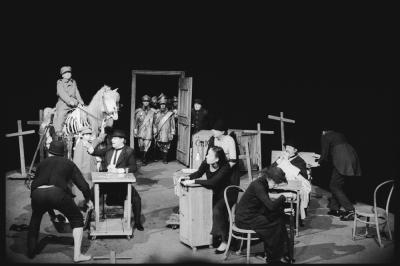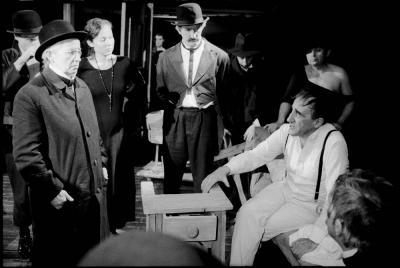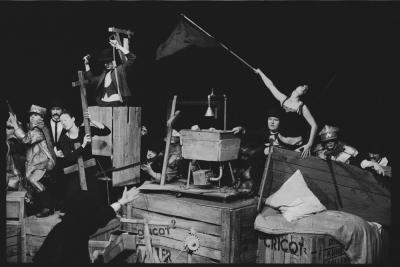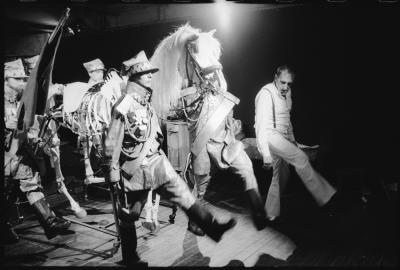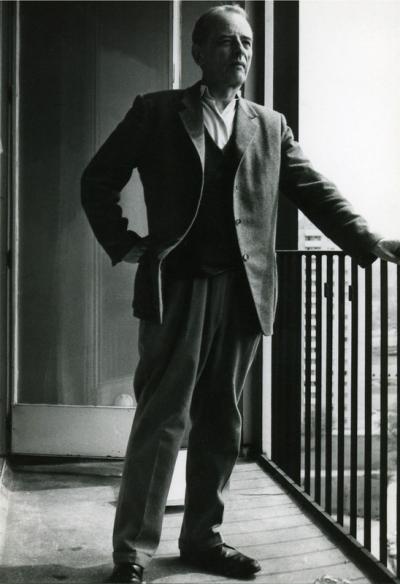Tadeusz Kantor in Nürnberg
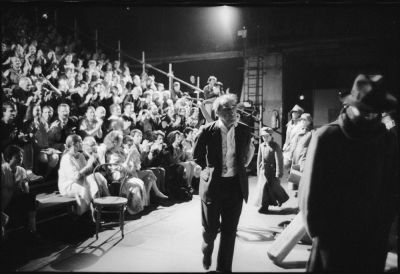
When Tadeusz Kantor climbed into the plane to travel from Warsaw to Nuremberg on 29th April 1985 he was accompanied by the members of his famous theatre “Teatr Cricot 2“ who had already made a name for themselves in the West. They were bringing their new play to Germany, a world premiere with which they would create another milestone in theatre history: “Artists should Croak” (Niech sczezną artyści).
“Teatr Cricot 2”, under the artist, painter, set designer, director and dramaturg Tadeusz Kantor, began work on “Artists should Croak“ in January 1985 in his hometown of Kraków. They were invited to Nuremberg by Dr. Karl Gerhard Schmidt, who was then the owner of the largest private bank in the Federal Republic of Germany. Schmidt, an art collector and generous patron of the arts, had found a home in the bank for the Polish Honorary Consulate in Nuremberg. Karl Gerhard Schmidt first became aware of Tadeusz Kantor in 1977 when he saw a performance of his play “The Dead Class“ (Umarła klasa) in the Alte Messehalle in Nuremberg. He was enthralled by the show and promptly turned Kantor into “his own” artist. Schmidt visited Kantor in Kraków to look at “The Dead Class“ in its place of origin, the Kszysztofory Theatre. Along with the “Institute for Modern Art“ in Nuremberg and the “Centro di Ricerce Teatrali“ in Milan Karl Gerhard Schmidt now became the personal producer of a masterpiece by the great Tadeusz Kantor.
Tadeusz Kantor was born on 6th April 1915 in Wielopole, 130 kilometres east of Kraków. At the time Wielopole was a small Polish-Jewish town in the border area of the Austrian-Hungarian monarchy. His father, who was also extremely fond of theatre, was the village teacher, and during the First World War he fought on the side of the Polish independence army. Tadeusz Kantor grew up without his father. This is the reason why his mother, Helena Berger, remained his most important personal contact until her death. He spent his school years in the village school in Wielopole and at a grammar school in Tarnów where he passed his A-levels in 1933. In the autumn of that year Kantor began a course in law at the Jagiellonen University in Kraków but this lasted a mere two weeks. He quickly switched to a private painting school run by Zbigniew Pronaszko (Wolna Szkoła Malarstwa) and in November 1934 he began a course in painting at the Academy of Fine Arts (Akademia Sztuk Pięknych) in Kraków. This is where he directed his first plays. He completed his studies at the Academy with distinction on 12th December 1939. During the Second World War he was a member of an underground artists’ theatre group and in 1942 he set up his own theatre under the name of “Teatr Niezależny” (The Independent Theatre). The first show presented by “Teatr Niezależny” was Balladyna (1943) by Juliusz Słowacki.
After the war Tadeusz Kantor initially worked as a set designer at the “Stary Teatr” (The Old Theatre) in Kraków. All this time, however, he never gave up painting. In 1946 his picture “Portret malarza” (A Portrait of the Painter) was exhibited at the first International Exhibition of Contemporary Art in the Palais Chaillot in Paris. This was followed by a huge number of individual and group exhibitions. Tadeusz Kantor then spent six months in Paris on an artists grant awarded by the Polish Ministry of Art and Culture. When he returned in 1947 he was appointed a professor at the State Art School (then the Academy of Fine Arts) in Kraków. But following anonymous libellous comments and reports from a party functionary he was expelled from the art school in 1950 and returned to work as a set designer in the “Stary Teatr” and “Teatr Słowackiego” in Kraków.
